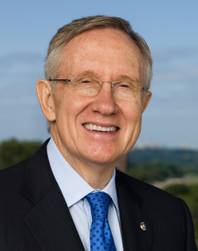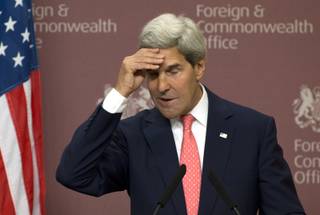Published Monday, Sept. 9, 2013 | 12:54 p.m.
Updated Monday, Sept. 9, 2013 | 8:30 p.m.

Harry Reid
WASHINGTON — Sen. Harry Reid announced Monday night that he will delay plans to have the Senate vote to authorize limited strikes against Syria, to give President Barack Obama more time to update Congress on a rapidly changing situation.
“I don’t think we need to see how fast we can do this,” Reid said. “We have to see how well we can do this matter.”
Reid, who supports limited strikes, had argued earlier on Monday that supporting the military option is a must for anyone with a conscience.
“‘The hottest places in hell are reserved for those who in times of great moral crisis maintain their neutrality,’” Reid said, quoting Dante’s Inferno to explain his views on Syria.
“Some say it’s not our fight. Some say Syria is too far away. Some say it’s not in our security interest,” Reid said. “I believe America must set the example for the rest of the world.”
But on Monday, already tenuous support for military engagement in Congress was further weakened by reports that Russia had persuaded Syria to turn over its chemical weapons to international authorities.
In interviews with television networks Monday afternoon, Obama sounded positive about the developments — and said he had in fact, already discussed them with Russian President Vladimir Putin during last week’s G20 conference.
“If we can exhaust these diplomatic efforts and come up with a formula that gives the international community a verifiable, enforceable mechanism to deal with these chemical weapons in Syria, then I’m all for it,” Obama told PBS’s NewsHour. "But we're going to have to see specifics."
The developments are further slowing a process that had already begun to lose momentum over the weekend.
As Congress returned Monday, doubts — especially in the House — threatened to derail Obama’s effort to earn congressional approval for military strikes in Syria.
Against that backdrop, Reid pledged that the Senate would vote on Wednesday to authorize limited strikes in Syria. Reid did not entirely take that option off the table Monday night — he simply said that he intended to give Obama more time to make his case, amid changing circumstances, to lawmakers and the country on Tuesday night, and would set up a Syria vote “when appropriate.”
Procedurally, Reid is expecting to need 60 votes to overcome a filibuster.
Urging lawmakers to “remember our history,” Reid cited the death tolls from mustard gas in World War I and gas chambers in the Nazi concentration camps of World War II, as specters that might drive lawmakers to vote in favor of the authorization. And he recounted images from videos of an Aug. 21 attack on civilians — especially children — in Ghouta, Syria.
“If we allow Assad’s use of chemical weapons to go unchecked and unanswered, hostile forces around the world will assume these type of attacks are permissible,” Reid said. “That’s why the massacres in Syria are our business and our concern, both as humans and Americans.”
But while Reid’s passion was palpable, his arguments did not cut to the core of what skeptics have been voicing as their prime concerns.
One concern, raised immediately after Reid’s comments by Sen. Dan Coats, R-Ind., is whether Reid and others in favor of strikes are motivated by their moral outrage or by a desire to protect the credibility of the president, who last year called the use of chemical weapons in Syria a “red line.”
“I’m certain that if the president had not drawn his red line, Assad’s use of chemical weapons would be roundly condemned,” Coats said. “But we would be no more near to engage in this civil war than in other conflicts” where chemical weapons have been used.
Another unanswered concern comes from the ranks of Reid’s own Nevada delegation. Both Republican and Democratic representatives have shared in Reid’s revulsion at the attack, but they have openly wondered whether the U.S. has given enough thought to what might happen after a limited strike.
“It is not enough to just send a message to Assad without understanding the implications for our long-term strategy in Syria, in the Middle East and with Iran and North Korea,” Rep. Steven Horsford, D-Nev., said last week.
In an interview with Charlie Rose broadcast on PBS Monday night, Syrian President Bashar al-Assad warned the United States that if there is an attack, “you should expect everything” in response, both from the Syrian government and from terrorist groups.


Join the Discussion:
Check this out for a full explanation of our conversion to the LiveFyre commenting system and instructions on how to sign up for an account.
Full comments policy